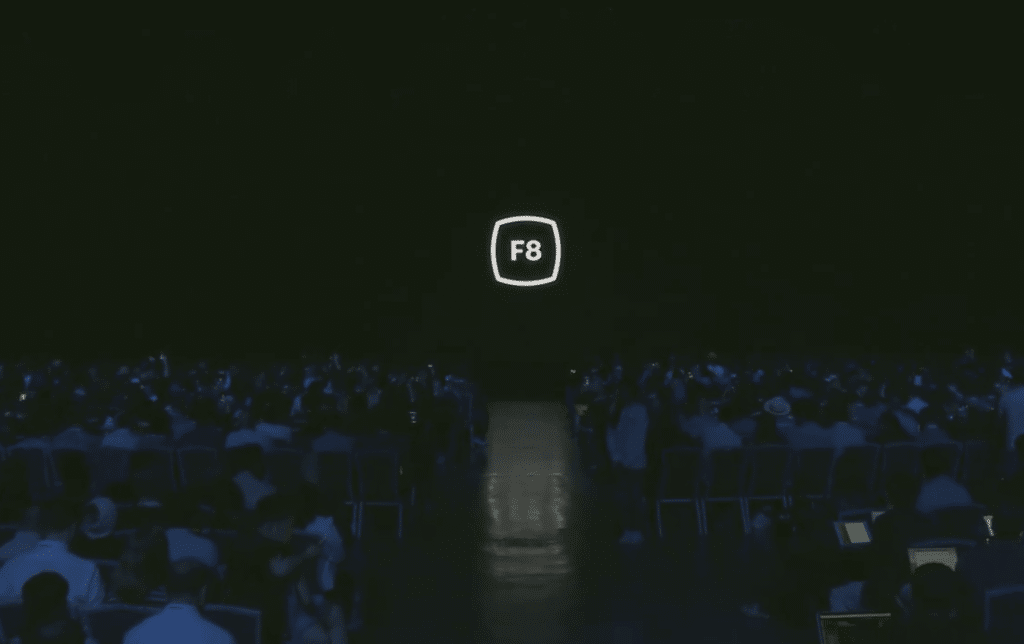
Today lanyarded app developers, social media savants, and digital marketing aficionados sporting Facebook blue t-shirts gathered at the McEnery Convention Center in San Jose, California to watch executives and notable engineers speak about their latest projects at the F8 2019 convention.
Although many sent their applications, crossed their fingers, and hoped to receive an invite to the event this time around, not all were allowed to attend. For those who didn’t receive acceptance to this year’s F8 2019 convention (or for those who were present at the event but somehow fell asleep throughout the keynote speeches), here’s a recap.
Facebook Delves Deeper into Online Dating
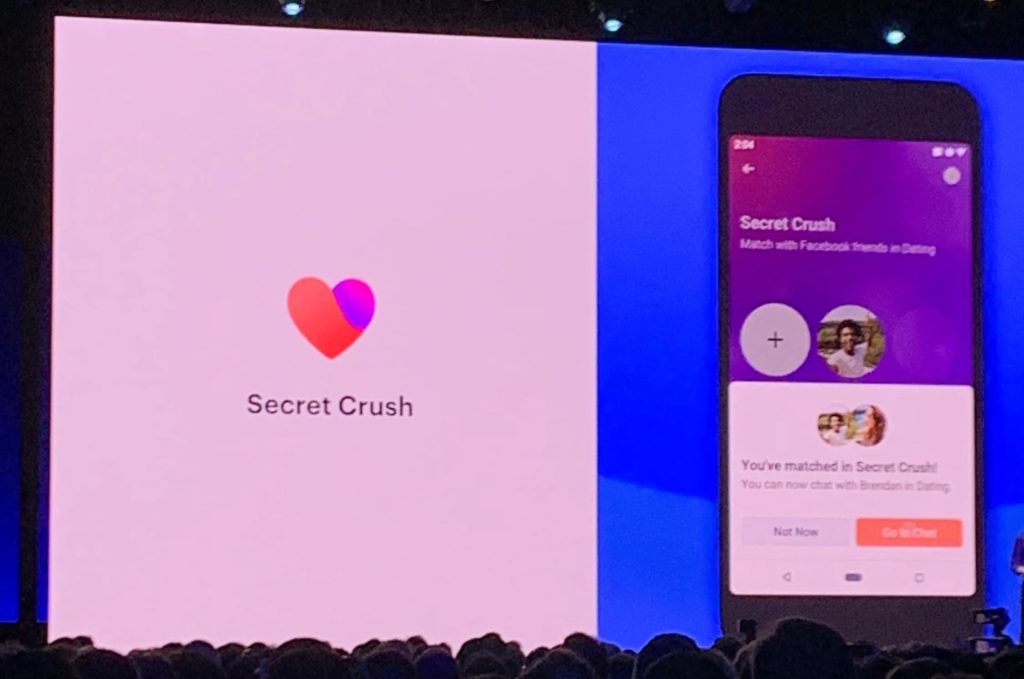
Back in September of 2018, Facebook rolled out a test of its dating service to users in Colombia. Several months later, Facebook rolled it out to more than a handful of countries, including Canada, Thailand, and Mexico.
Although not yet available to US users—perhaps Facebook wants to perfect the service before rolling it out to the United States—the social network announced that the service, simply dubbed “Dating,” will have a feature called Secret Crush, a tool that lets users anonymously share their romantic desires to other users.
With Secret Crush, users can select no more than nine friends to whom they can anonymously express their interest. The friends in the list will then receive a notification from Facebook stating, “A friend added you as a secret crush.” If, for example, Mary Jane picked Joe as a secret crush and vice versa, Facebook will reveal the names of the users, exposing their mutual interest toward one another.
Secret Crush, by only revealing the identities of the secret admirers if the feelings are mutual, brings couples together, couples who otherwise would have been too bashful to disclose their hearts’ desires.
Facebook Says Goodbye to Its Signature Blue Theme
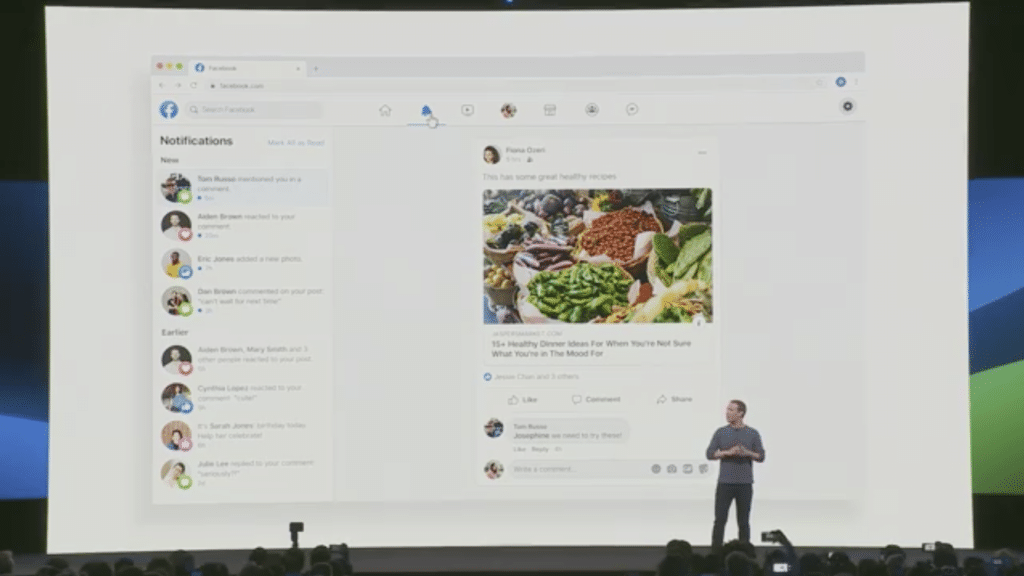
For years the Facebook brand has been associated with the color blue. Place a lowercase “f” in front of a blue square and almost everyone will recognize that as the Facebook logo.
However, after all these years of being blue, Facebook is parting with its signature color. Today, Facebook CEO Mark Zuckerberg announced in his keynote speech that Facebook desktop and mobile are getting new looks. Facebook’s headers will no longer be in blue. Rather, they will appear in white, giving the website a sterilized look.
But the changes to Facebook’s interface doesn’t end with the replacement of its signature color. This new design was created to, as Zuckerberg put it, make communities “as central as friends.” In the middle of the website and app headers are tabs that display community-focused features: Watch, Stories, Marketplace, Friend Requests, and Messenger. The goal, said Zuckerberg, is to make connecting with groups and communities as easy as connecting with friends.
The new design also makes content consumption easier. With the new Facebook comes a bookmarking feature that lets users mark their spot on News Feed so they can return to it when they exit the app or desktop window. Furthermore, the desktop version will have a dark mode version, giving users’ eyes a relief from screen viewing. The new design rolls out to mobile today and to desktop in the next few months.
Instagram Shopping Rolls Out to Creators and Explore
Today, Instagram is rolling out Buying from Creators, a feature that allows users like bloggers and influencers to use Shoppable Tags on their Instagram posts. Much like the Shoppable Tags users see from brands and businesses, Buying from Creators allows influencers to tag items, like makeup, clothing, and accessories, in their photos or videos. When users click those items, tags will appear with product information and pricing. Users can also click on the tag’s CTA button to purchase the items from the retailer’s website.
Additionally, shopping is also rolling out as a separate channel in Explore. This new channel will be a hub for all existing shoppable posts, organized within the subcategories beauty, clothing and accessories, home, jewelry and watches, baby and kids, and travel.
WhatsApp Remains Private
WhatsApp is rolling out a Business Product Catalog to its Business app. The catalog allows users to feature several products that they sell in one page. For example, a clothing retailer may showcase several customized t-shirts for buyers to see.
Despite the changes to WhatsApp, the messaging service is remaining steadfast in its dedication to privacy. The app will keep all of its statuses, calls, messages, and locations encrypted, staying true to Mark Zuckerberg’s belief that “the future is private.”
Portal Will Have AI, Security, and More
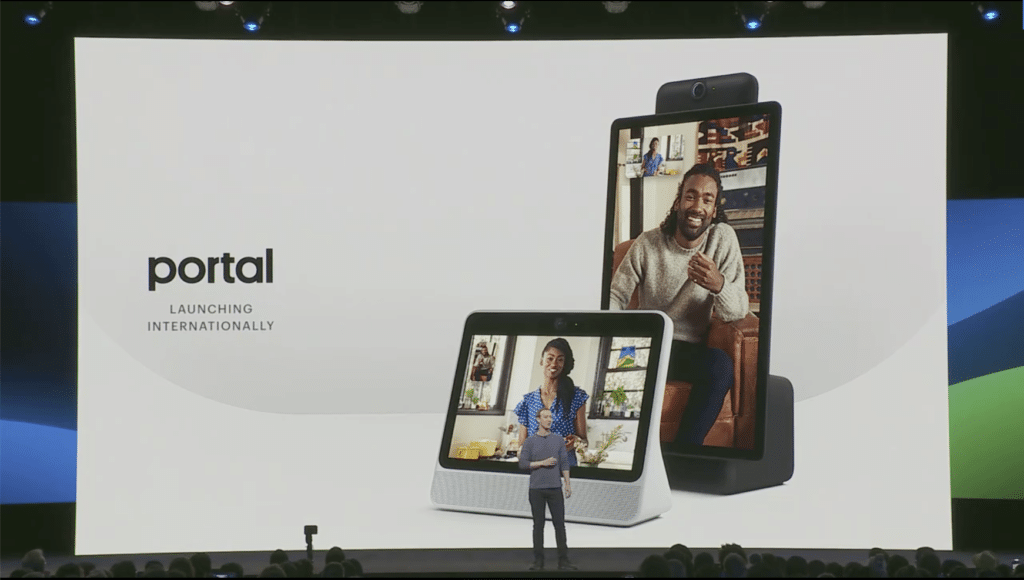
A product created by Facebook, Portal allows users to video chat. As announced during today’s F8 event, Portal will be integrated with WhatsApp, allowing friends and family to make WhatsApp calls, with end-to-end encryption. Portal will also have AI voice assistant, similar to Amazon’s Alexa.
To make Portal both practical yet fun, Facebook is adding games and AR filters, added monthly, to the device’s video calls. The new Portal will also come with a Facebook Live feature, a private video messaging capability, and an app through which users can add photos from their phones to their Portals.
Previously Portals were only available in the United States. However, in June, it will be available to Canada and Europe.
Spark AR Will Be Available to More Devices
More than one billion people use AR filters across Facebook’s family of apps. These filters are made possible by Spark AR Studio, a software that helps creators make AR effects for Facebook, Messenger, and Instagram cameras. Due to AR’s popularity among users, it’s no surprise that Facebook is rolling out the software to Windows devices. Spark AR was previously only available to Macs.
Spark AR is a novice-friendly software, attracting both code-savvy creators and novices unfamiliar with coding. The software has resources for new users, such as tutorials on its website and a Facebook group where amateurs and professionals alike can have discussions and share ideas.
A few brands and celebrities already use Spark AR to create their own custom filters. This list includes celebrities such as Ariana Grande and Kylie Jenner.
Facebook Continues to Improve AI Technology
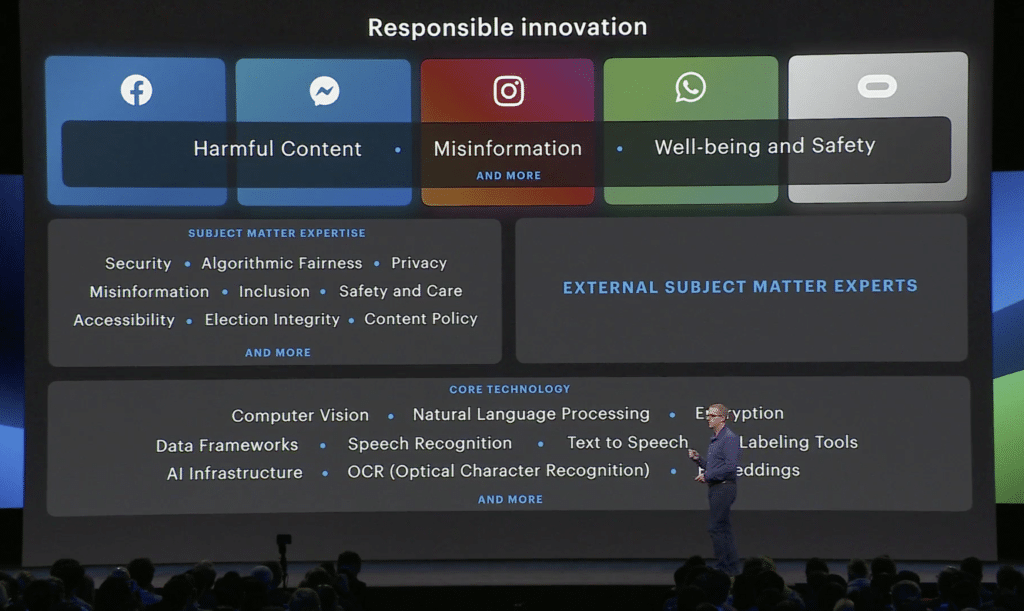
The past two years have been a tumultuous time for Facebook, a time when the company had been hit by one scandal after another. Security issues, misinformation, and violent content were a few of the problems that plagued Facebook since 2016.
Faced with public ire, Facebook has been under immense pressure to improve its platform, to ensure the social network is a safe space for users. At F8, CTO Mike Schroepfer discussed the measures Facebook takes to eliminate policy-violating users and the progress the company has made in AI technology.
To keep its family of apps safe, Facebook has developed teams with expertise on certain subject matters. For example, there’s a team that ensures Facebook Groups abide by the platform’s policies. There’s another working for Instagram that monitors bullying and harassment. Although these dedicated experts keep Facebook a safer place, manual labor alone can’t monitor the actions of more than two billion monthly active users. To fill in the gaps, Facebook employs AI technology.
AI is Facebook’s sleepless policy enforcer, searching for content violations in perpetuity. The AI scans a post, and, if it deems the content to be in violation of Facebook’s Community Standards, takes it down. Throughout the years, Facebook’s AI technology has improved. So far the AI can better determine whether or not a post violates policies by scanning the image, the text, and the comments section. It also adopts faster by learning and practicing with data provided by Facebook’s engineers.
Oculus Makes Virtual Reality Gaming Social
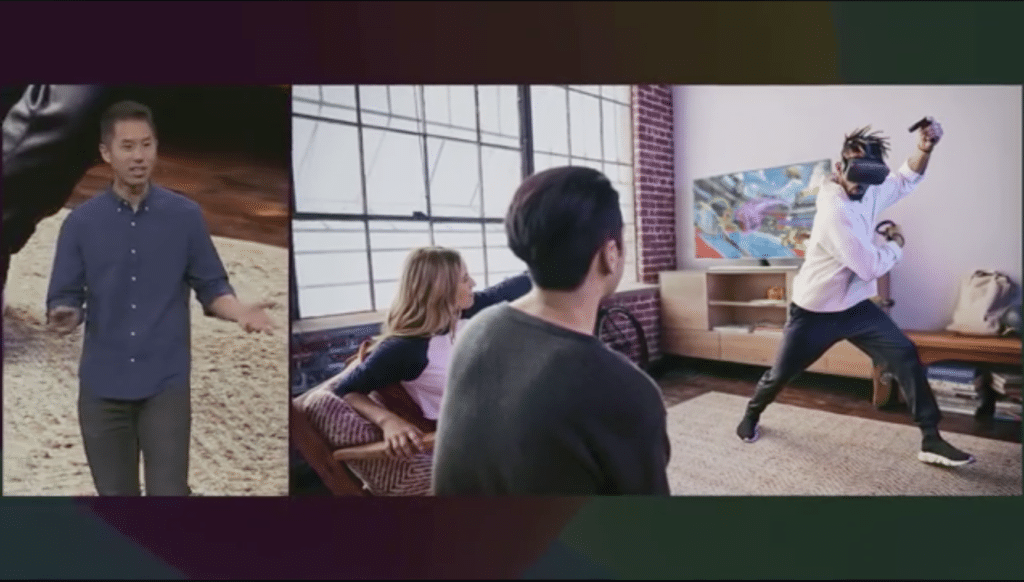
Many avid gamers enjoy playing with friends. Some play Call of Duty with strangers from long distances, using headsets and microphones to communicate during a match. Others like to keep gaming personal and intimate, inviting friends over for a competitive round of Mario Cart. However, the social aspect of gaming was not as well developed for Oculus as it was for devices like Xbox or Playstation. Playing with a group of friends with Oculus was difficult until now.
The new Oculus allows players to cast their games to TV screens, showing friends the game that unfolds before the gamer’s VR headset. Oculus also allows players to connect cross-platform so that they may play with friends no matter the device they use. For those who don’t have the headsets, Oculus allows gamers to play from their mobile phones.
The New Messenger Is Light Speed
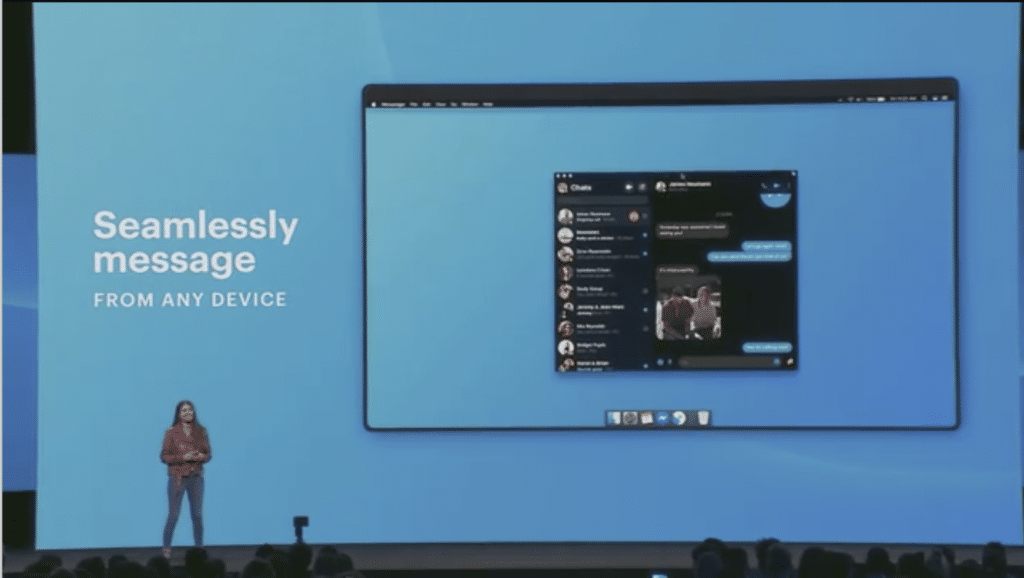
At last year’s F8 event, Facebook announced Messenger 4, an update that included a new look to the app: the addition of the three separate tabs Chats, People, and Discover. Today, Facebook announced a new version of Messenger called Light Speed. In this update, the company is adding more features to improve privacy. Light Speed will have end-to-end encrypted conversations and more ephemeral content—users can now delete messages from their chats.
Light Speed also has features that benefit businesses. It has an appointment booking feature, which allows customers to make appointments and to receive booking reminders. The latest Messenger version will also have lead generation templates.
With the new update, the Friends tab of Messenger will focus on social, adopting some of the features from Facebook News Feed. In the Friends tab, users can post status updates, view Stories, share memories, and join watch parties.
Messenger Light Speed is available to Windows and Mac desktop devices. The previous versions of Messenger were only available to mobile devices.
Each year media buyers, app developers, and ad agencies congregate to one spot of the map, San Jose, California, to catch the latest news on Facebook and its family of apps. Today Facebook announced several exciting and unexpected changes not only to its app but also to the product it owns—F8 was certainly not an event to miss.
